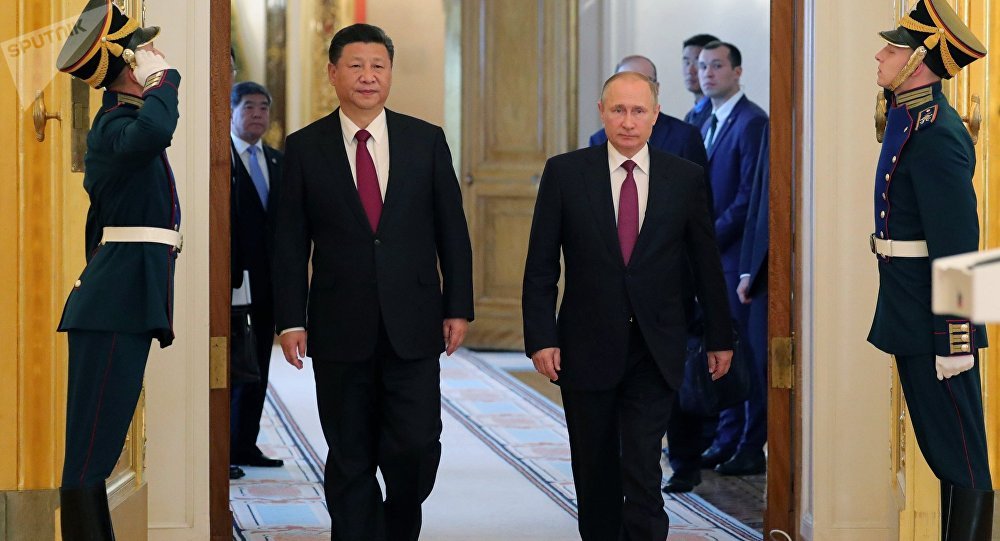
 The US sanctions and tariffs spree is drawing Russia and China closer together, providing new opportunities for the development of bilateral trade in the agricultural and energy fields, Chinese scholars say, stressing that the countries' economies complement each other.
The US sanctions and tariffs spree is drawing Russia and China closer together, providing new opportunities for the development of bilateral trade in the agricultural and energy fields, Chinese scholars say, stressing that the countries' economies complement each other.
The Sino-American trade war has opened the way to the further development of economic cooperation between China and Russia, Chinese scholars say.
"The trade war between China and the United States will have a detrimental effect on the global economy. It will affect both China and Russia's economic development. But at the same time it has provided certain opportunities for the development of economic cooperation between Russia and China", said Sun Zhangzhi, the director of the Institute of East European, Russian, and Central Asian Studies at the Chinese Academy of Science (IEERCAS).
According to Sun, the US-driven trade war is pushing Russia and China to boost their mutual trade turnover, especially when it comes to energy and agriculture. He noted that at the same time, the US and EU sanctions regime is forcing Moscow to diversify its partners and turn to Beijing.
To illustrate his point, the scholar pointed out that previously China had imported agricultural goods mostly from the US and Canada. "Now we are diversifying suppliers, importing farm products from other countries", he said, stressing that it provides a great opportunity for Russia.Meanwhile, China, the world's largest buyer of soybeans, reportedly put the purchase of US soy on hold amid the Sino-American trade war that resumed in mid-May 2019 after the trade talks ended without a deal. After the talks, the Trump administration slapped higher tariffs on $200 billion of Chinese goods, with Beijing responding by raising taxes on $60 billion of US products.
China's apparent decision to suspend purchasing US soybeans will have a negative impact on American farmers. According to Forbes, the soybean price has considerably plummeted amid the US-China tariff spree. While a soybean bushel cost $10.50 before Trump's trade war started, it fell to $8.60 in 2018, the media outlet pointed out.
Russo-Chinese Energy Cooperation to Grow as Beijing Turns Its Back on US LNG
For his part, Zhao Huasheng, a professor at Shanghai-based Fudan University, placed emphasis on the boosting of Russo-Chinese energy cooperation as US LNG shipments to China face 25-percent tariffs. Beijing has targeted US hydrocarbons in response to Trump's latest tariff spree.
"Natural gas is a particularly promising area, including pipeline gas", Zhao said. "While we don't have so much pipeline gas yet, China has begun to import [Russia's] liquefied natural gas (LNG). It comes to the Bohai Gulf from the Arctic Ocean. In the future, LNG supplies will increase significantly".
In addition to the Power of Siberia project signed by Gazprom and the China National Petroleum Corporation (CNPC) in May 2014, aimed at delivering 38 billion cubic meters of natural gas a year to China, Russia has started supplying the People's Republic with LNG. Currently, Russia runs two LNG plants: one is Novatek's Yamal LNG on the Arctic Yamal Peninsula, and the other is Gazprom's Sakhalin-2 in the Far East.Previously, the Trump administration persuaded Beijing to buy more super-chilled fuel from the US. However, Reuters reported on 10 May that no LNG vessels that left the US in March and April had gone to the People's Republic, citing Refinitiv Eikon shipping data. Thus, only four LNG cargoes reached their destination in China over the past six months, while a year ago, that number was 35, according to The Hill. China's tariffs and supposed decision to turn its back on American super-chilled fuel put the US LNG export projects at risk, the media outlet warns.
China and Russia Dealing With Roughly the Same Problem
The scholars believe that Russia and China have found themselves in a similar geopolitical situation. According to Li Yongquan, the director of the Institute of International Relations at the Chinese Academy of Sciences, the US and its allies are trying to contain Russia and China's economic development, with the Sino-American trade imbalance issue being used as a smokescreen.
"The United States imposed sanctions on the Russian Federation, and a trade war can also be viewed as a type of sanctions", Li opined. "The United States is guided by the principle of the primacy of American interests in relations with other countries. But this approach has no prospects. One can say that the rivalry between the United States and China brings China closer to Russia".
Li noted that the Russian and Chinese economies complement each other, while Moscow and Beijing's interests largely overlap."I think that together we can completely offset the impact of US sanctions on Russia and the trade war between China and the United States. We just need to unlock the full potential of bilateral trade and cooperation [between Russia and China]. This will benefit both Russia and China, and the rest of the world", the Chinese scholar underscored.
By the number of personal meetings, Russian President Vladimir Putin has become the leader among Chinese President Xi Jinping's other counterparts.
The next meeting of the leaders is scheduled for 5-7 June, when Xi will come to Russia to take part in the St Petersburg International Economic Forum. According to Chinese Deputy Foreign Minister Zhang Hanhui, the presidents of Russia and China are due to sign two important joint documents during Xi's state visit to Russia. The first one is a statement on a comprehensive plan for the joint development and cooperation of Russia and China. The second one covers issues related to international strategic stability.



_jpg/250px-ElbeDay1945_(NARA_ww2-121).jpg)





